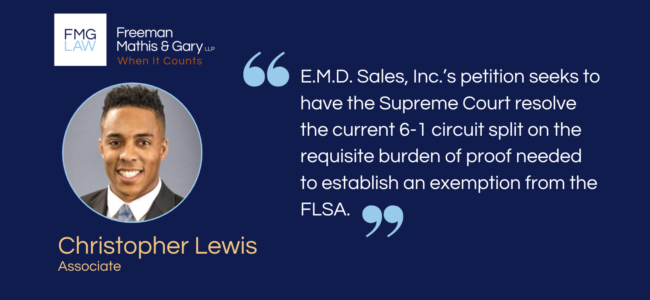BlogLine
E.M.D. Sales, Inc. v. Carrera: What burden of proof must employers meet to establish an FLSA exemption?
11/19/24

Is the burden of proof for employers to establish the applicability of a Fair Labor Standards Act (“FLSA”) exemption a mere preponderance of the evidence or clear and convincing evidence? That issue was argued before the Supreme Court of the United States on November 5, 2024 after the Supreme Court granted E.M.D. Sales, Inc.’s petition for a writ of certiorari to review the judgment of the United States Court of Appeals for the Fourth Circuit in Carrera v. E.M.D. Sales, Inc., 75 F.4th 345 (4th Cir. 2023). In Carrera, the Fourth Circuit held that when an employer defends a FLSA action on the ground that its employee falls within an exemption to the overtime pay requirement, the employer “bears the burden of proof on that question and must carry that burden under a clear and convincing evidence standard.” Currently, there is a 6-1 circuit split on the burden of proof for employers to establish a FLSA exemption. The Fifth, Sixth, Seventh, Ninth, Tenth, and Eleventh Circuits resolve the FLSA exemption issue under a preponderance of the evidence standard. The Fourth Circuit requires employers to meet their burden under a clear and convincing evidence standard.
The FLSA establishes minimum wage, overtime pay, record keeping, and youth employment standards affecting employees in the private sector, as well as in federal, state, and local governments. Covered nonexempt employees are entitled to overtime pay at a rate not less than one and one-half times the regular rate of pay for every hour worked in excess of 40 hours in a workweek. Exempt employees are not entitled to overtime pay. The FLSA exempts employees who meet a salary level test, a salary basis test, and a job duties test. However, some jobs are categorically exempt from the FLSA’s overtime provision, such as those where an employee is engaged in outside sales. The following requirements must be met in order for the outside sales exemption to apply: (1) the employee’s primary duty must be making sales (as defined in the FLSA), or obtaining orders or contracts for services or for the use of facilities for which a consideration will be paid by the client or customers, and (2) the employee must be customarily and regularly engaged away from the employer’s place or places of business in performing such primary duty.
In the case before the Supreme Court, Respondents are current and former sales representatives of E.M.D. Sales, Inc. At the district court level, the employees claimed that E.M.D. Sales, Inc. failed to pay them overtime wages as required by the FLSA. E.M.D. Sales, Inc. argued that the employees were subject to the FLSA’s outside sales exemption and, therefore, not entitled to overtime pay. The United States District Court for the District of Maryland held that E.M.D. Sales, Inc. failed to demonstrate by clear and convincing evidence that its current and former employees’ primary duties as sales representatives were to make sales as defined by the FLSA, exempting the employees from overtime pay. On appeal, the United States Court of Appeals for the Fourth Circuit affirmed the district court’s ruling that E.M.D. Sales, Inc. bore the burden of proving whether its employees fell within an exemption to the overtime pay provision of the FLSA under a clear and convincing evidence standard.
E.M.D. Sales, Inc.’s petition seeks to have the Supreme Court resolve the current 6-1 circuit split on the requisite burden of proof needed to establish an exemption from the FLSA. As certiorari has been granted, we can anticipate the Supreme Court providing guidance on the requisite burden of proof required for employers to establish whether an employee falls within an exemption to the FLSA for all circuits to follow.
For more information, please contact Christopher Lewis at chris.lewis@fmglaw.com or your local FMG attorney.
Share
Save Print
